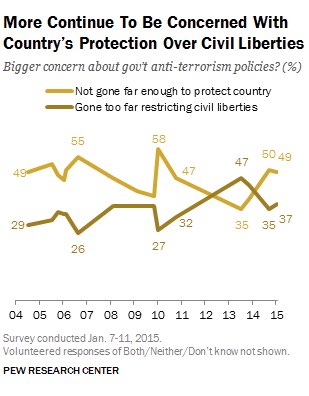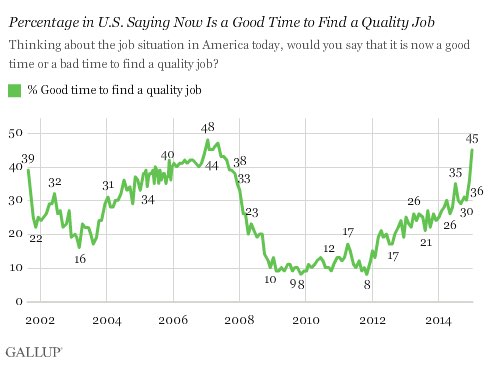
The attacks in Paris reinforce Americans' existing attitudes about terrorism. Even Americans who don't favor mocking religion support the right to do it. And cable news may affect vote choice most among those who don't vote. This is HuffPollster for Tuesday, January 13, 2015.
LITTLE CHANGE IN TERROR WORRIES - Pew Research: "In the aftermath of deadly terrorist attacks in Paris — and months after the start of U.S. airstrikes against ISIS — there has been little change in the public’s worries about an imminent terrorist attack in the United States. One-in-four (25%) are very worried about a domestic terrorist attack happening 'soon,' while about four-in-ten (39%) are somewhat worried; 36% are not too worried or not at all worried. That balance of opinion has not significantly changed since last July. The long-term trend on terrorism concerns has been fairly stable, except on a few occasions, since the fall of 2001….The new national survey by the Pew Research Center, conducted Jan. 7-11 among 1,504 adults, finds that about half of the public (49%) is more concerned that the government’s anti-terrorism policies haven’t gone far enough to protect the country, while 37% are more concerned that these policies have gone too far in restricting civil liberties. This is little changed since September – amid growing concern over the threat from ISIS – but dramatically different from attitudes in 2013, following Edward Snowden’s disclosures about NSA surveillance." [Pew]
Past terrorist incidents watched more closely - Bruce Drake: "About three-in-ten Americans (29%) say they had followed the news from Paris very closely, according to a new Pew Research Center survey. The previous terrorist attacks that had drawn the highest shares of American news interest resulted in significant numbers of casualties. One was the 2005 bombings of three trains and a bus in London that killed 52 people and injured more than 700. The second was the 2004 assault of Chechen rebels on a Russian school that resulted in more than 300 deaths, about half of them children. In both cases, 48% of Americans said they had followed those stories very closely." [Pew]
AMERICANS SUPPORT THE RIGHT TO MOCK RELIGION - HuffPollster: "In the survey, 63 percent of Americans, including virtually identical percentages of Republicans and Democrats, said it's more important to protect free speech than to shield the dignity of religious beliefs….That vast support for the right to publish, or republish, objectionable content does not translate into widespread comfort with the idea of mocking religion. Though 65 percent said cartoons mocking religious figures are acceptable, just 22 percent called them completely acceptable, while 43 percent said they were acceptable but in poor taste. Most Americans think media outlets should publish content satirizing political parties or other countries, but they're about evenly split on whether race and religion should receive similar treatment. Which religion is being mocked matters. Americans said by a 2-point margin that ridiculing Christianity is unacceptable, but found ridiculing Islam acceptable by a 10-point margin." [HuffPost]

CABLE NEWS: AN EFFECT, BUT AMONG NOT-VOTERS? - Natalie Jackson: "A recent Washington Post article indicated that if the Fox News Channel had not existed, then-Vice President Al Gore would have gotten 1.3 percent more of the national presidential vote in 2000, and the publication implied that this could have changed the election's outcome….If you're shocked that a media organization could change election outcomes, relax -- a closer look at what we know about voting behavior reveals it isn't very likely….When the analysis is restricted to only registered voters, Fox News increased the Republican vote share by 0.9 percentage points. But there are still 10-15 percent of registered voters who do not vote. Survey research can tell us quite a bit about these people who don't vote. They are the same people as those who are likely to be swayed by accidentally watching a cable news network for a few minutes: those without strong attachments to party, ideology, or candidates, and those who are generally disinterested in or disenchanted with politics. It's likely most of the people in that 0.9 percent whose preferences were affected by Fox News did not actually vote." [HuffPost]
AMERICANS MORE POSITIVE ABOUT JOBS - Frank Newport: "Serving as another indication of the public's perceptions of an improving economy, 45% of Americans now say it is a good time to find a quality job, up from 36% in December, and as high as this indicator has been since May 2007...These more upbeat perceptions about quality jobs accompany several other Gallup measures that indicate an improved U.S. jobs situation. Gallup's unadjusted unemployment rate for December was down to 5.8% -- the lowest in its five-year history -- and similar to the 5.6% reported by the government's Bureau of Labor Statistics, which was the lowest since the early months of the recession. Gallup's Job Creation Index -- a measure of workers' perceptions of hiring trends where they work -- has been at its highest post-recession levels in the latter part of 2014." [Gallup]
CHECKING IN ON 2016 - Mitt Romney, who took steps this week to launch another possible bid for the presidency, has the lead in GOP primary polling, thanks in large part to his still-near universal name recognition and an extremely high favorability rating among Republicans. The six polls taken between last October and December that included his name found him taking between 19 and 21 percent, with other candidates hovering at 10 percent and lower. In polls where Romney wasn't included, Jeb Bush emerged as one of the strongest candidates, taking 23 percent in a December CNN poll. Another much-discussed candidate, Paul Ryan, who announced that he isn't considering a run, has been faring less well in the polls, with a near 10 percent average gradually falling to closer to five. (Yes, it's
far too early for presidential polling to predict the eventual nominee -- but it does show that Romney starts off with a significant core of support.) [Pollster chart]
HUFFPOLLSTER VIA EMAIL! - You can receive this daily update every weekday morning via email! Just click here, enter your email address, and click "sign up." That's all there is to it (and you can unsubscribe anytime).
TUESDAY'S 'OUTLIERS' - Links to the best of news at the intersection of polling, politics and political data:
-The average favorable rating of the two political parties remains at record low levels. [Gallup]
-Nate Cohn sees Mitt Romney complicating Jeb Bush's nomination path, and possibly helping Rand Paul. [NYT]
-Nate Silver places Romney in the establishment circle of the GOP's "five ring circus." [538]
-Democrats are unlikely to regain the House in 2016, says Stu Rothenberg, but their odds are better than they were last year. [Roll Call]
-Michelle Ye Hee Lee highlights some red flags to "fishy polling" on carbon taxes. [WashPost]
-YouGov's Peter Kellner advises British politicians to "stand up for their convictions...in the face of unwelcome polls." [YouGov via Opinion Today]
-Andrew Gelman explains when "statistically significant but not practically significant" can mislead. [AndrewGelman.com]
-The Brookings Primary Project shares the dataset it collected on the 2014 primary elections. [Brookings]
-Nathan Gonzales will take the helm of the Rothenberg Political Report as editor and publisher. [Roll Call]
-Scott Rasmussen launches his new venture (and it's not about polling). [Styrk]
-Here is a map of every goat in the United States. [WashPost]


